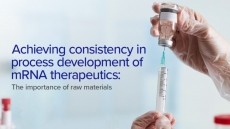NORDIC LIFE SCIENCE DAYS
Genetic disease drugmakers should sponsor at-home genetic tests, advises consultant

Unlike traditional genetic testing procedures, direct-to-consumer (DTC) genetic tests are available to purchase online, and offer people access to their genetic information without involving a physician.
According to Craig Wylie, partner of management consultancy Arthur D. Little, affordable DTC tests, combined with a population that is well informed about their gene profile, has helped form a new industry with significant financial and therapeutic potential.
“Today, people are very aware if their parent or grandparent had breast cancer or Alzheimer’s, or one of the other diseases that are genetically transmitted,” Wylie told delegates at Nordic Life Science Days in Sweden last month.
“And given that the DTC price point is $100-300 today, and dropping every week, [a growing number] of people who have reason to believe they might be at risk will be taking direct-to-consumer at-home genetic tests within the next few years,” he said.
The testing industry “is going to create a $50bn [€42.5bn] employment pool of people who want to know about their genetic background…within 10-12 years from now,” he added.
What does this mean for drugmakers?
Wylie predicts this new, $50bn industry will directly influence patient numbers.
“The number of people suffering from the top 15 genetically-linked indications…generates a population, in the developed world, of approximately 500 million that have a 25% chance or greater of contracting these diseases.
“So, your potential population of people interested in knowing about their genetic background – and once informed, doing something about it – is phenomenally large,” explained Wylie.
As gene therapies for a growing number of indications develop, “you can expect to see an explosion of people testing themselves, and taking these therapies,” he added.
While currently just five markets in the world can afford to buy DTC tests, which are then conducted at three labs worldwide, Wylie stressed that improving access to genetic testing will have a positive impact on the biopharmaceutical industry.
A number of firms have already invested in this industry. Roche announced plans to acquire genomic profiling testing company Foundation Medicine in June, 2018, and the following month GlaxoSmithKline signed a database sharing agreement with genetic testing firm 23andMe.
“Getting easily available genetic testing in place is a key part of the strategy for delivery PD1 inhibitor-type products,” Wylie added.
Wylie’s comments are particularly timely, as regulatory approval for PD1 inhibitor therapies Keytruda (pembrolizumab) and Yescarta (axicabtagene ciloleucel) extends beyond the US, into European markets.






















